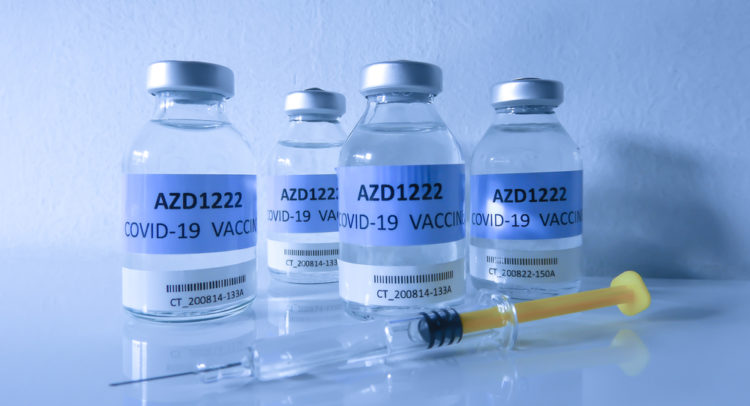AstraZeneca said that its coronavirus vaccine candidate, which it is developing together with Oxford University, has shown an average efficiency of 70% and met the primary endpoint in preventing COVID-19.
Discover the Best Stocks and Maximize Your Portfolio:
- See what stocks are receiving strong buy ratings from top-rated analysts.
- Filter, analyze, and streamline your search for investment opportunities with TipRanks’ Stock Screener.
AstraZeneca (AZN) disclosed “positive” high-level results from an interim analysis of clinical trials of its candidate, AZD1222, in the UK and Brazil, which showed no hospitalisations or severe cases of the disease in participants receiving the vaccine. A total of 131 COVID-19 cases were registered in the interim analysis.
More specifically, an independent Data Safety Monitoring Board concluded that the analysis met the primary endpoint of preventing COVID-19 infection 14 days or more after receiving two doses of the vaccine. No serious safety events related to the vaccine were found. AZD1222 was well tolerated across both dosing regimens.
The announcement comes after Pfizer last week filed for US emergency use authorization (EUA) for its COVID-19 vaccine after it was shown to be 95% effective and Moderna announced that its COVID-19 candidate was over 94% effective, based on data from the Phase 3 trial.
Backed by the interim efficacy data, AstraZeneca is now readying regulatory submissions to authorities around the world that have a framework in place for conditional or early approval. The UK drugmaker will seek an emergency use listing from the World Health Organization for a fast-track pathway to vaccine availability in low-income countries.
“Today marks an important milestone in our fight against the pandemic. This vaccine’s efficacy and safety confirm that it will be highly effective against COVID-19 and will have an immediate impact on this public health emergency,” AstraZeneca CEO Pascal Soriot said. “Furthermore, the vaccine’s simple supply chain and our no-profit pledge and commitment to equitable and timely access means it will be affordable and globally available, supplying hundreds of millions of doses on approval.”
The interim data analysis revealed that one dosing regimen resulted in vaccine efficacy of 90% when AZD1222 was given as a half dose, followed by a full dose at least one month apart. Another dosing regimen showed 62% efficacy when given as two full doses at least one month apart. The combined analysis from both dosing regimens resulted in an average efficacy of 70%.
Clinical trials are also being conducted in the US, Japan, Russia, South Africa, Kenya and Latin America, with trials planned in other European and Asian countries. In total, AstraZeneca expects to enroll up to 60,000 participants globally.
The drugmaker said it is on track for manufacturing capacity of up to 3 billion doses of the vaccine in 2021 on a rolling basis, pending regulatory approval. The vaccine can be stored, transported and handled at normal refrigerated conditions for at least six months and administered within existing healthcare settings, AstraZeneca said.
AZN shares are up 6.3% over the past month, taking this year’s advance to 11%. (See AstraZeneca stock analysis on TipRanks). That’s with a Moderate Buy analyst consensus backed by 2 unanimous Buy ratings.
Meanwhile, the average analyst price target stands at $63, which puts the upside potential at about 14% in the coming 12 months.
CFRA analyst Wan Nurhayati recently reiterated a Buy rating on the stock with a $61 price target as she believes that the company’s new medicines will help grow revenue in the high single-digit percentage range in 2020.
Nurhayati doesn’t expect AstraZeneca’s COVID-19 vaccine candidate to be a major profit driver, as the drugmaker is prioritizing affordable distribution.

Related News:
FDA To Review Pfizer-BioNTech Covid-19 Vaccine On Dec. 10
Pfizer Expected to File FDA EUA Application for COVID-19 Vaccine Today
Mesoblast Teams Up With Novartis to Develop COVID-19/ARDS Stem Cell Therapy; Shares Up 17%









